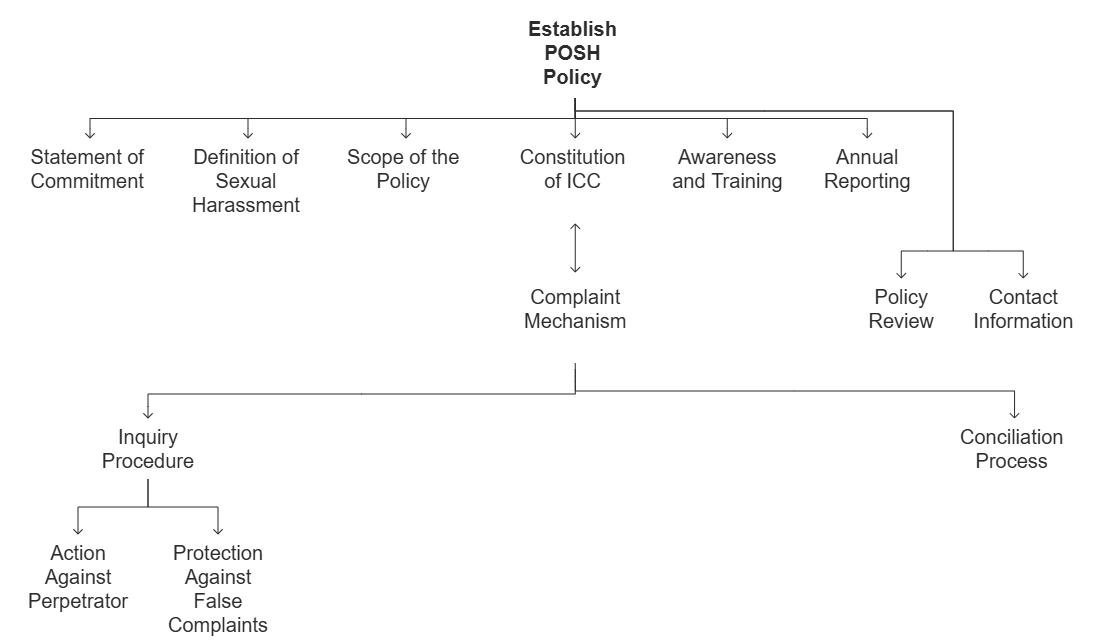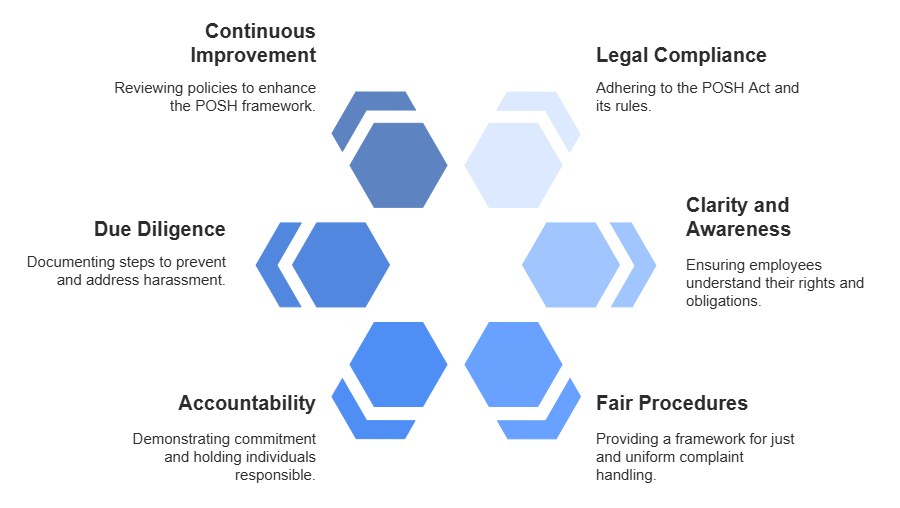A robust POSH (Prevention of Sexual Harassment) policy and thorough documentation are fundamental for any organization to comply with the POSH Act 2013 and, more importantly, to foster a safe and respectful workplace.

POSH Policy:
The POSH Act specifies the composition of the ICC, which should include:
A well-defined POSH policy serves as the cornerstone of an organization's commitment to preventing and addressing sexual harassment. It should be easily accessible to all employees and clearly outline the organization's stance and procedures. Key elements of a comprehensive POSH policy include:
- Statement of Commitment: A clear and unequivocal statement expressing the organization's zero-tolerance policy towards sexual harassment.
- Definition of Sexual Harassment: A detailed explanation of what constitutes sexual harassment, aligning with the definition provided in the POSH Act. This should include various forms (physical, verbal, non-verbal, visual, digital) with illustrative examples.
- Scope of the Policy: Clearly state who the policy applies to (e.g., all employees, including permanent, temporary, contractual, trainees, visitors, clients at the workplace). It should also specify where the policy applies (e.g., workplace premises, during work-related travel, events, online interactions).
- Constitution of the Internal Complaints Committee (ICC): Details about the formation, composition, and contact information of the ICC. This should include the names and roles of the Presiding Officer and other members, including the external member.
- Complaint Mechanism: A clear and accessible procedure for employees to file complaints of sexual harassment. This should outline:
- Who to submit the complaint to (the ICC or a designated person).
- The format for filing a complaint (written or electronic).
- The timeline for filing a complaint (within three months from the date of the incident, with possible extensions).
- Assurance of confidentiality.
- Information about the support available to the complainant.
- Inquiry Procedure: A detailed step-by-step process that the ICC will follow when conducting an inquiry into a complaint. This should adhere to the principles of natural justice, ensuring fairness to both the complainant and the respondent. It should include timelines for each stage of the inquiry.
- Conciliation Process (Optional but Recommended): If the complainant desires, the policy can outline the process for attempting conciliation before initiating a formal inquiry, provided that monetary settlement is strictly prohibited.
- Action Against the Perpetrator: Clearly state the range of actions that can be taken against an individual found guilty of sexual harassment, in accordance with the organization's service rules or other applicable regulations. These can include warnings, transfers, suspension, termination, etc.
- Protection Against False Complaints: Include a statement that while the organization is committed to addressing genuine complaints, action can be taken against individuals who file false or malicious complaints after due inquiry.
- Awareness and Training: Outline the organization's commitment to conducting regular awareness programs and training sessions for employees and ICC members on the POSH Act and the policy.
- Annual Reporting: Mention the requirement for the ICC to submit an annual report as per the Act and rules.
- Policy Review: State that the policy will be reviewed periodically to ensure it remains relevant and compliant with the law.
- Contact Information: Provide contact details of relevant individuals or departments for any queries or assistance related to the policy.

Documentation:
Thorough and accurate documentation is crucial for effective implementation of the POSH Act and for demonstrating compliance. Key documents that need to be maintained include:
- The POSH Policy Document: The official written policy, duly signed and disseminated to all employees.
- Records of Awareness Programs and Training: Dates, topics covered, participants, and materials used for awareness sessions and training programs conducted for employees and ICC members.
- ICC Formation Documents: Official notification or order constituting the ICC, including the names and designations of all members and the external member. Any changes in the ICC composition should also be documented.
- Complaint Records: A register or file containing all complaints received, along with the date of receipt. Ensure confidentiality is maintained in these records.
- Inquiry Proceedings: Detailed records of each inquiry conducted by the ICC, including:
- Statements of the complainant and the respondent.
- Records of any witnesses examined and their statements.
- Evidence presented (written, electronic, etc.).
- Minutes of ICC meetings during the inquiry.
- Observations and findings of the ICC.
- Recommendations of the ICC: The written recommendations made by the ICC to the employer after the completion of the inquiry.
- Action Taken Report: Records of the actions taken by the employer based on the ICC's recommendations.
- Conciliation Records (if applicable): Documentation of any conciliation proceedings, including the terms of settlement (if reached).
- Annual Reports: Copies of the annual reports submitted by the ICC to the employer and the District Officer, along with acknowledgment of receipt.
- Policy Review Records: Documentation of any reviews or updates made to the POSH policy, along with the dates and reasons for the changes.
- Communication Records: Records of any communication related to POSH, such as notices, circulars, and responses to employee queries.

Importance of Policy and Documentation:
- Legal Compliance: Adhering to the requirements of the POSH Act and its rules.
- Clarity and Awareness: Ensuring all employees understand their rights and obligations.
- Fair and Consistent Procedures: Providing a framework for handling complaints in a just and uniform manner.
- Accountability: Demonstrating the organization's commitment and holding individuals accountable for their actions.
- Evidence of Due Diligence: In case of legal scrutiny, proper documentation serves as evidence that the organization has taken necessary steps to prevent and address sexual harassment.
- Continuous Improvement: Reviewing policies and documentation helps identify areas for improvement in the organization's POSH framework.
By having a comprehensive POSH policy that is effectively communicated and consistently implemented, supported by meticulous documentation, organizations like NBC Elite Solutions can create a workplace where employees feel safe, respected, and empowered.






